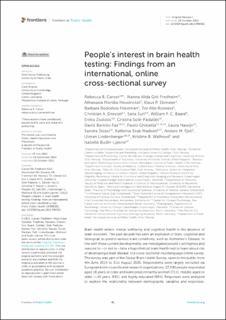| dc.contributor.author | Carver, Rebecca Bruu | |
| dc.contributor.author | Fredheim, Nanna Alida Grit | |
| dc.contributor.author | Mowinckel, Athanasia Monika | |
| dc.contributor.author | Ebmeier, Klaus P. | |
| dc.contributor.author | Bodorkos Friedman, Barbara | |
| dc.contributor.author | Rosness, Tor Atle | |
| dc.contributor.author | Drevon, Christian A | |
| dc.contributor.author | Suri, Sana | |
| dc.contributor.author | Baaré, William F. C. | |
| dc.contributor.author | Zsoldos, Eniko | |
| dc.contributor.author | Solé-Padullés, Cristina | |
| dc.contributor.author | Bartrés-Faz, David | |
| dc.contributor.author | Ghisletta, Paolo | |
| dc.contributor.author | Nawijn, Laura | |
| dc.contributor.author | Düzel, Sandra | |
| dc.contributor.author | Madsen, Kathrine Skak | |
| dc.contributor.author | Fjell, Anders Martin | |
| dc.contributor.author | Lindenberger, Ulman | |
| dc.contributor.author | Walhovd, Kristine B | |
| dc.contributor.author | Ljøsne, Isabelle Sylvie Budin | |
| dc.date.accessioned | 2022-12-07T12:17:35Z | |
| dc.date.available | 2022-12-07T12:17:35Z | |
| dc.date.created | 2022-11-17T13:05:09Z | |
| dc.date.issued | 2022 | |
| dc.identifier.citation | Frontiers in Public Health. 2022, 10, 1-19. | en_US |
| dc.identifier.issn | 2296-2565 | |
| dc.identifier.uri | https://hdl.handle.net/11250/3036353 | |
| dc.description.abstract | Brain health entails mental wellbeing and cognitive health in the absence of brain disorders. The past decade has seen an explosion of tests, cognitive and biological, to predict various brain conditions, such as Alzheimer's Disease. In line with these current developments, we investigated people's willingness and reasons to—or not to—take a hypothetical brain health test to learn about risk of developing a brain disease, in a cross-sectional multilanguage online survey. The survey was part of the Global Brain Health Survey, open to the public from 4th June 2019 to 31st August 2020. Respondents were largely recruited via European brain councils and research organizations. 27,590 people responded aged 18 years or older and were predominantly women (71%), middle-aged or older (>40 years; 83%), and highly educated (69%). Responses were analyzed to explore the relationship between demographic variables and responses.
Results: We found high public interest in brain health testing: over 91% would definitely or probably take a brain health test and 86% would do so even if it gave information about a disease that cannot be treated or prevented. The main reason for taking a test was the ability to respond if one was found to be at risk of brain disease, such as changing lifestyle, seeking counseling or starting treatment. Higher interest in brain health testing was found in men, respondents with lower education levels and those with poor self-reported cognitive health.
Conclusion: High public interest in brain health and brain health testing in certain segments of society, coupled with an increase of commercial tests entering the market, is likely to put pressure on public health systems to inform the public about brain health testing in years to come. | en_US |
| dc.language.iso | eng | en_US |
| dc.rights | Navngivelse 4.0 Internasjonal | * |
| dc.rights.uri | http://creativecommons.org/licenses/by/4.0/deed.no | * |
| dc.title | People's interest in brain health testing: Findings from an international, online cross-sectional survey | en_US |
| dc.title.alternative | People's interest in brain health testing: Findings from an international, online cross-sectional survey | en_US |
| dc.type | Peer reviewed | en_US |
| dc.type | Journal article | en_US |
| dc.description.version | publishedVersion | en_US |
| dc.source.pagenumber | 1-19. | en_US |
| dc.source.volume | 10 | en_US |
| dc.source.journal | Frontiers in Public Health | en_US |
| dc.identifier.doi | 10.3389/fpubh.2022.998302 | |
| dc.identifier.cristin | 2075588 | |
| dc.relation.project | EU – Horisont Europa (EC/HEU): 732592 | en_US |
| cristin.ispublished | true | |
| cristin.fulltext | original | |
| cristin.qualitycode | 1 | |

